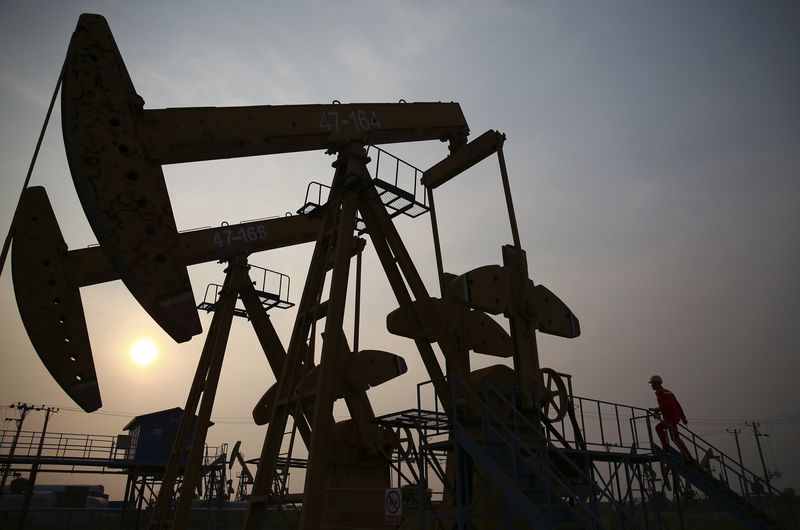By Shariq Khan and Arathy S Nair
(Reuters) - Just like the street hustler turned commodities broker in the 1980s comedy "Trading Places" for which he named his twitter account, @WillRayValentin (BRV) is an outsider making waves in the world of energy stocks trading.
A petroleum engineer by background, BRV is a member of the 'Energy Fintwit' (EFT) community on Twitter made of oil industry insiders - engineers, geologists and former traders - who have gained notoriety and thousands of followers for their unabashed bearish tweets about the U.S. shale industry.
As U.S. crude oil prices halved in March under the weight of recession fears and a price war, many of the group's members had a field day as their 'shorts' on U.S. shale companies - bets that their stock prices would fall - paid off.
BRV's own trading account, which he shared with Reuters, showed he pocketed $4 million in just one week between March 9 and March 16.
"I've made a lot more money shorting energy stocks than my entire career working 9-5. It was like picking money up off the street," BRV told Reuters in a phone interview. Like many others, he will not reveal his name, citing fears of industry retribution.
With their invective-laden diatribes against oil executives, memes and cartoons, posts by the likes of BRV, @HalliBu78316368 (Halli Burton) or @EnergyCynic (Energy Cynic), have gotten greater attention last year following some prescient calls.
"If you want to know the real narrative in energy, particularly the bear arguments on investor relations, you have to be on Twitter," said Ethan Bellamy, energy sector analyst at RW Baird, one of some half a dozen analysts and investors who told Reuters following the group is now part of their routine.
Its most prominent member is @Mr_Skilling (Mr. Skilling), whose alias is an ironic tribute to Jeff Skilling, a former executive jailed for his role in the accounting scandal that brought down energy trading giant Enron nearly two decades ago.
Mr. Skilling counts journalists, analysts and politicians among his roughly 9,000 followers, more than some well-regarded industry analysts.
Jeff Skilling's lawyer did not respond to requests for comment.
(GRAPHIC: Energy Twitter Group's Reach on the Platform - https://fingfx.thomsonreuters.com/gfx/editorcharts/azgpozzyvdx/index.html)
Dan Pickering, founder and CIO at Pickering Energy Partners, and a 30-year energy sector veteran said posts by "guerilla activists" like Mr. Skilling do factor in his analysis.
"There are absolutely institutional investors that follow this space. I've gotten questions about Mr. Skilling from my investor base."
One of the group's most prescient calls was an Oct. 31 report in which @EnergyCredit1, BRV and @Oil_Gonif set a $0 price target for Whiting Petroleum Corp, warning about its high leverage and underperforming wells.
On April 1, the oil producer filed for bankruptcy, but at the time of the report, 30 out of 31 brokerages polled by Refinitiv had a "hold" or better rating for the stock.
Mr. Skilling's months-long battle with Tallgrass Energy LP, over guarantees of higher payouts for its management in a takeover by Blackstone (NYSE:BX) last year, also helped raise his and the group's profile.
Under fire from investors, the pipeline operator's CEO stepped down and Blackstone ultimately offered concessions to the company's common shareholders.
Tallgrass did not respond to requests for comment.
YOU'VE BEEN WARNED
The group's members acknowledge they could not have anticipated the coronavirus outbreak and the extent of the oil market rout, but they say the crash validates the argument they were making when oil was at $60, which is that many U.S. shale operators were unfit to survive a major shock.
"When oil was at $100 it was more difficult to identify the bad companies," says Halli Burton, whose Twitter profile declares she is the "VP of SHIT-Shale Health Investment Trust". "We are finally at a point today where we can start recognizing good and bad companies."
(GRAPHIC: Energy Twitter Group's Mix of Tweets - https://fingfx.thomsonreuters.com/gfx/editorcharts/dgkvladlpbx/eikon.png)
Not everyone agrees. The U.S. shale industry is by its nature a higher-cost supplier, which meets demand low-cost producers cannot satisfy when markets are strong, so it is bound to suffer in a slump, and just to blame the managers is too simplistic, the argument goes.
Still, for over a year now, there are signs of the group's arguments easing into the mainstream.
In November, analysts at Wolfe Research noted a rising volume of 'peak shale' tweets about rapidly slowing U.S. production growth signalling growing concerns about the sector's outlook.
UBS analysts, conscious that investors and industry executives at its annual conference were desperate to establish Mr. Skilling's true identity, last September promised him all the Presidente margaritas he needed at a Houston Chilli's restaurant if he would only turn up to meet the fans.
As expected, Skilling did not show.
